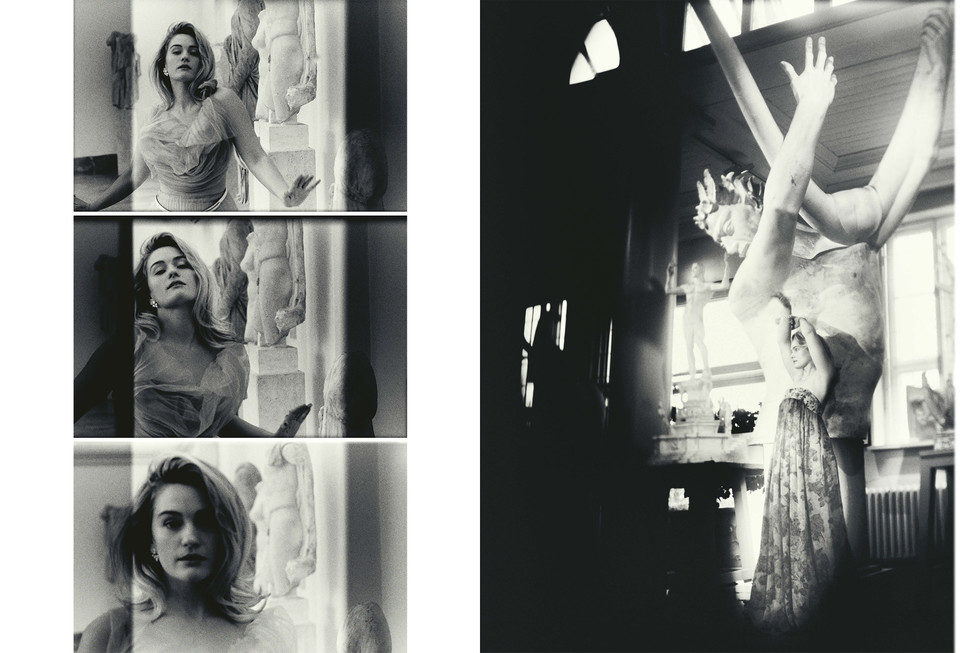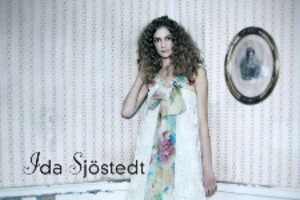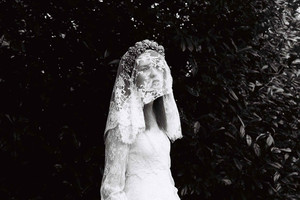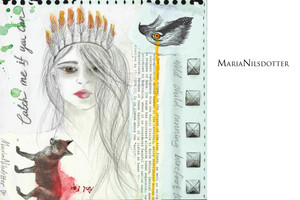Fragments: An Interview with Alicia Agneson
Written by Natalia Muntean by Filippa Finn“People keep saying I was brave, but I think I was just precocious,” says Alicia Agneson. Her story is one of determination and courage. Growing up on a farm in Eskilstuna, Agneson was always passionate about the stage - and as a child, she remembers seeing her dance teachers more than her parents at one point. They were the ones who inspired her to seek a more international career. At just fifteen years old, she moved to London to pursue her acting dreams and chase after bigger stages. It was not an easy path for her, but she never gave up. Her breakthrough role came several years later when she played Freydis, a queen in the hit TV show Vikings. Since then, she has starred in various TV and film projects, such as Little Kingdom, Clark, and The Courier, venturing into different genres and subjects.
Beyond her acting career, Agneson is deeply committed to making a difference. She actively works with Hope for Justice, an organisation that fights human trafficking and assists victims of modern slavery. She also wears another hat as Breitling's Scandinavian Ambassador, bringing her passion for storytelling and dedication to the brand. Whether on screen or off, Agneson continues to inspire.
“I believe that I always keep something from all the characters I play, locked away somewhere,” she reflects on the characters she has portrayed and the projects she has been involved in. While her recent focus has been more on acting in front of the camera, Agneson thinks that she will go back to her first love - the stage. As she playfully says, “they’ll have to drag me off it!”
Natalia Muntean: What inspired you to pursue a career in the entertainment industry?
Alicia Agneson: I think it wasn't that much of a choice. I was just drawn towards that like there was nothing else. And I started doing ballet when I was three, and then I think my parents kind of tried to stop me from going into it so much. By the age of nine, I was probably taking as many dance, singing and stage lessons as I could. Then I started doing musical theatre, moved to London, got into TV and film and onwards.
NM: You moved to London when you were 15. How do you think this experience changed your path?
AA: At that point, I'd done a lot of shows already across Sweden, so I was already working, which was probably quite unusual for a lot of people my age. I think I would be in a completely different place if I wouldn't have done that. In this industry, it's very much learning by doing, at least that’s how I developed. And it can take a while, you have to work. So for me, it's the greatest gift I've ever been given, first of all, to get the allowance to move away so young, and start working so early. But there were, of course, challenges. I think, in my head, I was very driven and I didn't understand that I was that young. Moving to London was a big change for me, as I had to adjust to a different way of life. My parents drove me all the way to London, and I'll never forget taking the tube to Piccadilly Circus, coming up and seeing the lights, the West End and Shaftesbury Avenue. I remember standing there and feeling more than ever that I was in the right place!
NM: Was there a specific moment when you realised “Oh, I want to be an actress?”
AA: I always wanted to be in musical theatre, I had always loved it and that is what I worked towards. When I came to London, I got the opportunity to perform in a show called Cinderella where I played the lead role. I became very close to a fellow cast member who suggested that I should try my hand at TV and film. I thought it sounded like fun and decided to give it a go. I started doing more TV and film work, including commercials, with my agent at the time. However, I quickly realised that acting on the screen was very different from what I was used to. It was a more introverted style of acting, with a greater focus on emotions and drama. I found this fascinating and decided to pursue TV and film further. When I approached my musical theatre agent about my interest in TV and film, they said I had no experience or education in that area and they could not help me. It wasn’t that long ago, but back then we used to post our CVs, so I sent letters to every agent in London and one out of a hundred, probably, picked me up. I was still very young at that point, probably 18 when he started sending me to castings. After a couple of months, I signed Vikings.
NM: What was it like being part of such a popular show?
AA: We had an amazing time on the set of Vikings. It was an incredible journey for me, as I started with a very small role and had no prior experience in TV and film. I wasn't supposed to come back, but the writer felt that I had amazing chemistry with my screen partner and wanted to bring me back as a queen. It was a surprise, but I was excited to learn and grow. On my first day on set, I had to learn basic industry terms by doing. It was a challenging but fun experience from the first day until the last. I was very shocked when they called me and told me that they wanted to make me queen. I think many people often overlook the fact that I was still very young at the time, even if I had been working incredibly hard for many years in London, trying to get that one chance. I remember calling my father because Vikings was a show we loved watching together back then, and it felt surreal to tell him.
NM: Do you prepare differently for when you’re on stage and when you’re in front of the camera because you mentioned the difference in acting?
AA: Massively! Doing stage, first of all, you and your ensemble will do lots of rehearsals together. Usually, you would do rehearsals for months, up to six months. And on stage, you act throughout what you're doing, what you're saying, what you're singing, your dance moves. In comparison, acting in front of the camera is completely different. And often in the productions that I've been in, I don't meet my co-stars until the day I'm on set and that can be impactful, as you act differently in regards to who you act with. So it's a whole different process, especially doing the character work. In the recent Netflix series I was part of, Clark, I portrayed a woman who's still alive. So obviously, this required me to learn the appropriate accent, movement, and behaviour of people from that era. It's a whole different mindset. So that's sort of just me being isolated for weeks somewhere, preparing for the role. I always feel a responsibility towards the characters I portray, whether they are real or not. It's important to me to do justice to their story and struggles by portraying them in the most realistic way possible.
NM: How do you choose the characters you're going to portray?
AA: I wouldn't say that I have a definite preference when it comes to acting roles. It usually depends on my current mindset. I work very closely with my agent who helps me select interesting roles to audition for. I used to play a lot of queens and princesses, but now I'm exploring more complex and darker characters. It's really fun to play characters that are completely different from what you're used to. I'm starting my next feature film in just two months, which is a romantic comedy - a genre that I have never worked in before. That's the exciting part of my job - getting to explore new characters and genres.
NM: Is there something that you learnt about yourself with each role?
AA: For sure! I believe that subconsciously, you tend to pick up things about yourself, even if you try not to. You may make comparisons or memories may pop up or situations that you've been in before, and that's how you learn things about yourself that you didn't remember or didn't know. So I think with each character, you always learn something about yourself and keep something from all the characters you play, locked away somewhere. For instance, in Vikings, I had many scenes where I was pregnant and lost my child. I had to scream and cry to get over the loss, and that stayed with me for a while. I think your brain is aware that what you're doing is not real, but you are pushing your body to extreme emotional boundaries. I believe every project I've been a part of has had an impact on me. Different characters in different projects have also challenged me to find different aspects of myself.
NM: How do you prepare for such intense scenes? And then how do you unwind and separate yourself?
AA: I like to prepare myself by researching and learning about the historical context of the character I'm playing. For instance, if I were playing a woman from the Viking era, I would try to find out what it was like for a woman to give birth during that time. Did she have any support? Would she be at home, or would she be out and about up until the due date? This helps me get into character and understand the challenges my character might have faced. One of the most emotionally challenging roles I have played was in a feature film called Little Kingdom. I portrayed a woman who lived during the Second World War and lost many children due to stillbirth. It was tough emotionally, but I spoke to many elderly women, including my grandmother, to learn about what it was like to give birth during that period. It was devastating to hear their stories about the lack of medication and support during childbirth. However, this research helped me build my character, and I was able to bring her to life on the screen. During the filming of Little Kingdom, I cried nonstop for three months. It was emotionally draining, and it took me a long time to come out of that headspace. But I felt grateful to be a part of telling these untold stories of women and bringing these characters to life. It was a humbling experience, and it gave me a greater appreciation for the challenges that women faced during that period.
NM: Sounds like a privilege and a responsibility to bring those stories onto the screen! Do you have any tricks that help you snap out of character and become Alicia again?
AA: When I step into my dressing room, I take off my character’s clothes and do a little ritual. I hang her clothes and take off my wig and my makeup, so I have a completely clean slate. Then I put on my clothes, rings and other things that make me me. I try not to overthink and bring it home with me. But that’s easier said than done.
NM: Was there any moment in your career up until now when you felt you made it?
AA: I would say it was when I was part of the cast of Vikings, which was a really big show. I remember feeling like things had changed when someone recognised me on the street and said, “Oh my God, you're Alicia Agneson!” It was a new experience for me to have fans, extras, and crew wanting to take pictures with me on set. Another big change was when I started travelling abroad and being recognised in a different country. It was surreal to realise that people from a completely different part of the world knew who I was. This all happened quite early on in my career, so it was a big deal for me. It’s a strange experience, but also really cool.
NM: What do you do when you’re not acting?
AA: I've always been a farm girl at heart, and I quite enjoy being on my own with my family on my farm. That's where I'm happy and where I thrive. I try to be at the farm as much as possible. I love building, driving my tractor, planting and growing herbs and carrots. I love farming. So I try to do that as much as possible because I need the contrast between farm life and London.
NM: But if you weren't an actress what what do you think you would have become?
AA: I would be digging bones somewhere out in the desert and doing archaeology. I love history, treasures, and adventures, I love nature in general. And I like being alone. So I think I would be out there somewhere with a little brush, finding old birds and bones.
NM: What advice would you give to younger people trying to make a career in this area?
AA: I think first of all, I don't have a plan B. Once you have a plan B you've accepted that plan A won't work. And in this industry, you have to love it, you have to want to put in the work! You have to be mentally strong to handle the rejections. There are very few jobs in the world where you can face thousands of rejections, a normal thing in our industry, and still believe that you are meant for it. Loving it and wanting to work for it makes it all or nothing!
NM: Looking ahead, what do you hope for yourself? The actress and Alicia, the person?
AA: Acting-wise, I'm looking forward to a challenge, there's so much this year that I'm so excited to explore. Something to really sink my teeth into. And for myself… I'm very happy. I'm just very content right now, and I hope that I'll be able to stay that way for a little while.









